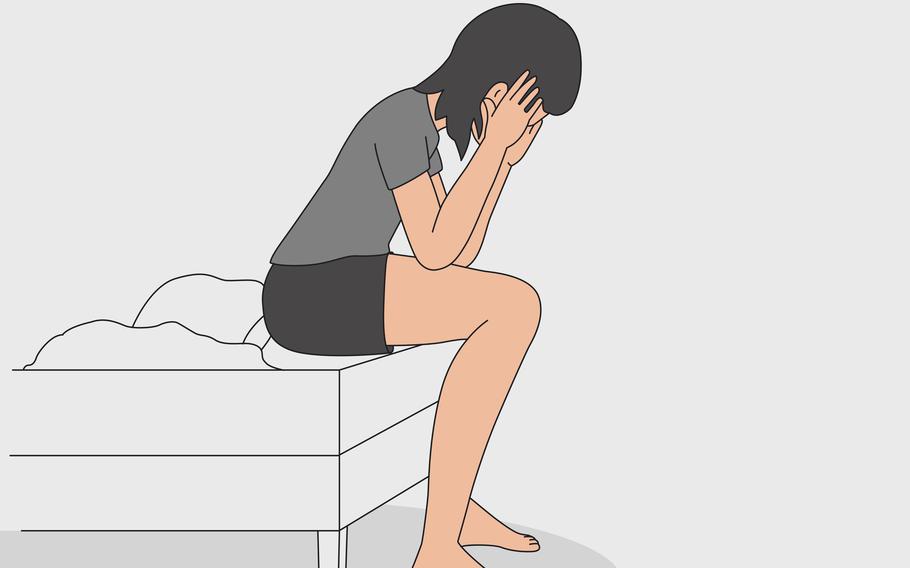
A woman sits on the edge of the bed and holds onto her head, a girl has a headache. (Vladyslav Severyn/Vector illustration)
In a world where we enjoy more comforts and freedoms than any generation before us, why do so many of us feel like victims? Our ancestors fought for the rights we now take for granted — facing slavery, segregation and disenfranchisement with courage and resolve.
Yet today, the language of victimhood blankets everything from micro-aggressions to systemic inequalities that pale in comparison to historical injustices. We live in one of the most privileged civilizations in history, yet the dominant cultural narrative is one of grievance rather than gratitude. Why? And what does this obsession with victimhood reveal about our psychology and society?
This paradox suggests a provocative idea: in modern culture, claiming victimhood seems more noble than celebrating victory. Why do we adopt this mindset, and what are the consequences for collective progress?
To grasp this shift, we must first look back. For centuries, oppression was a brutal, tangible reality. Enslaved people endured unimaginable hardship, women were denied fundamental rights, and entire populations suffered under colonial rule. The civil rights movements of the 20th century arose from necessity — people demanded dignity, equality and freedom from violence. These were battles against existential threats.
Today, the landscape has changed. We enjoy unprecedented safety, health and opportunity in much of the developed world. Life expectancy has soared, literacy is nearly universal, and technology has democratized access to information. Yet, the rhetoric of oppression has not retreated; it has expanded. When every grievance is framed as oppression on par with historical atrocities, the term loses its weight. When everything is oppression, nothing is.
Why, then, do we gravitate toward victimhood? Identifying as a victim can provide a sense of moral superiority and emotional validation. It shifts responsibility outward, allowing us to blame external forces — society, systems or others — for our struggles. This can feel liberating. It’s easier to point fingers than to wrestle with personal accountability. When people repeatedly encounter situations in which they feel powerless, they may internalize that helplessness — even in contexts where they do have control. In a culture that amplifies narratives of systemic injustice, it’s easy to adopt a victim mentality, seeing oneself as a pawn in an unfair world.
Victimhood also acts as a shield. Your experiences and emotions are often deemed unassailable if you’re a victim. Challenging someone’s victim status risks being labeled insensitive or oppressive, granting the victim a kind of social immunity. In this way, victimhood becomes a currency — a means to garner sympathy, attention and influence.
This creates a feedback loop: the more victimhood is celebrated, the more people are incentivized to cast themselves as victims. Entire communities and movements coalesce around collective victimhood, sometimes fostering division rather than solidarity. When groups vie for the title of “most oppressed,” it can spark a race to the bottom, shifting focus from solutions to a contest of suffering.
Past generations prized resilience and stoicism — values that helped them endure wars, economic hardship and overt discrimination. The ethos was to “tough it out” and triumph over adversity through grit and determination. Today, the pendulum has swung toward sensitivity and emotional openness. We’re urged to “speak our truth,” often framing that truth in terms of personal or collective victimhood. By prioritizing vulnerability over agency, we may be undermining our psychological strength.
The fallout is significant. On a personal level, a chronic victim mentality erodes agency. If you believe systemic forces render you powerless, you’re less likely to take action to improve your life — a self-fulfilling prophecy of helplessness.
Studies show that an external locus of control, where people attribute outcomes to outside factors, negatively affects mental health and motivation. Societally, an overemphasis on victimhood can paralyze progress. When the focus is on grievance rather than solutions, we get trapped in a cycle of blame. Real change demands that we address injustices while celebrating victories such as the dramatic declines in global poverty or the expansion of civil rights.
This mindset also skews our perception. By historical standards, we live in an era of extraordinary advancement. Yet, the narrative of perpetual victimhood insists things are worse than ever, overshadowing the privileges we take for granted — clean water, modern medicine, and freedoms our ancestors could only dream of.
Instead of exalting victimhood, we could champion resilience, agency and gratitude. We could honor past struggles while embracing present freedoms. We could foster a culture that values emotional expression and personal responsibility. In doing so, we might discover that victory — over adversity, over our limitations — carries far greater virtue than victimhood ever could.
Nafees Alam is a professor in social work at Boise (Idaho) State University. He wrote this for InsideSources.com.